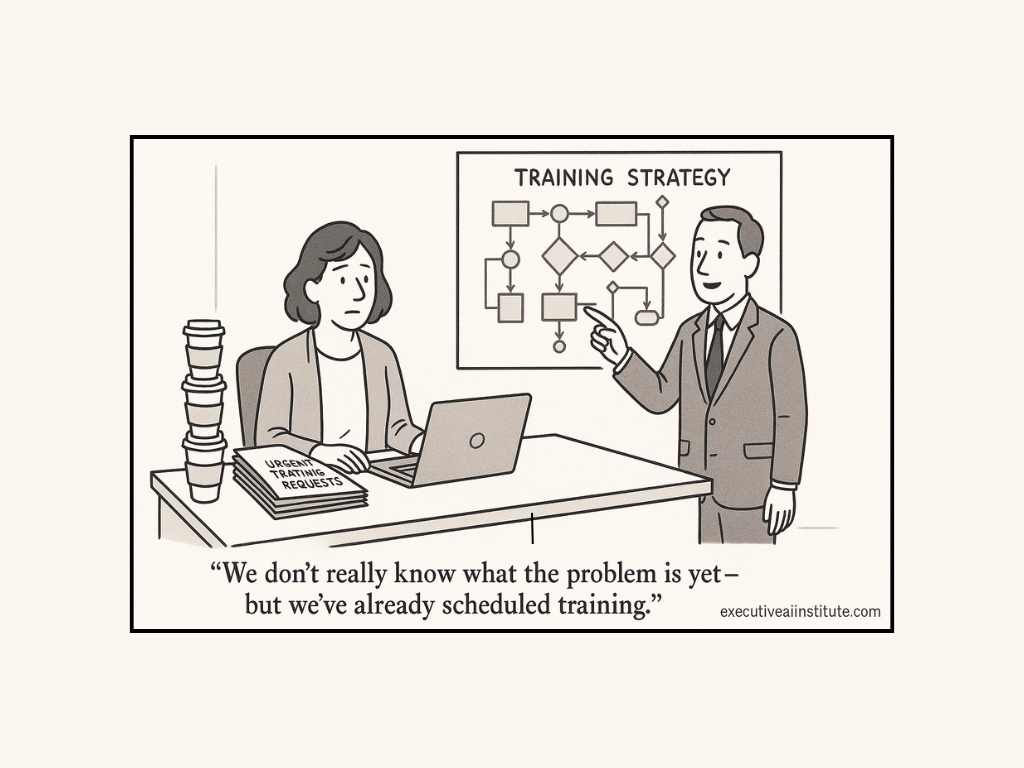As a learning professional, it can sometimes feel like you're expected to have all the answers. But let’s face it—none of us are mind-readers (no matter how many coffees we've had).
Before you start building dazzling e-learning modules or planning that next groundbreaking workshop, take a breath, pause your third espresso, and ask the right questions.
To help, here are 45 essential questions, crafted to ensure your learning intervention truly hits the mark. Because nobody ever said, "I wish we'd skipped the planning phase."
1. CLARIFYING THE REAL NEED (BECAUSE “JUST DO TRAINING” ISN’T A STRATEGY)
1. What ultimate business goal or performance problem are we really solving here?
2. Who exactly are we trying to help—and why them specifically?
3. What new skills or behaviours should we realistically expect from learners after this intervention?
4. Why aren’t these skills or behaviours already happening—have learners succeeded before?
5. Could this issue actually be solved by something simpler (like clearer processes or stronger coffee)?
6. What does success look like practically—are expectations clear enough?
2. DEFINING THE LEARNING REQUIREMENT (LESS IS DEFINITELY MORE)
1. What's the absolute minimum knowledge learners must remember for this intervention to be effective?
2. What can we provide as just-in-time resources instead of overwhelming learners upfront?
3. What core ideas or principles must learners genuinely connect with emotionally?
4. Which skills require practice opportunities versus simply theoretical learning?
5. How and when will learners get meaningful feedback?
3. UNDERSTANDING YOUR LEARNERS (REAL HUMANS, NOT JUST "PARTICIPANTS")
1. What's their starting point—novices, veterans, or a complicated mix?
2. How genuinely interested or motivated are learners likely to be (apart from looking good to their managers)?
3. What anxieties or aspirations might learners have about this learning experience?
4. Are learners’ basic skills (digital literacy, numeracy, language) sufficient, or do we need additional support?
5. How might cultural or generational factors shape learner preferences?
6. Have similar initiatives succeeded or failed previously, and why?
4. MAPPING AND MANAGING STAKEHOLDERS (EVERYONE’S GOT AN OPINION, UNFORTUNATELY)
1. Who else, beyond learners, cares about this initiative—and what exactly do they care about?
2. What outcomes specifically matter to these stakeholders?
3. Could stakeholders’ biases or preferences derail or enhance the project?
4. How and when should stakeholders be involved throughout the design and delivery process?
5. What evidence or success metrics will stakeholders actually trust and value?
6. Who has the ultimate decision-making power (it probably isn't you)?
5. NAVIGATING LOGISTICAL REALITIES (WHERE BRILLIANT PLANS MEET BRUTAL REALITY)
1. Exactly how many learners are involved, and how dispersed are they (time zones are not your friend)?
2. What's the real budget, not just the optimistic projection?
3. What are the exact deadlines for starting and completing this initiative?
4. How much learning time can realistically be allocated without sparking organisational panic?
5. Who internally can help—and what hidden talents might they have (besides disappearing at crunch time)?
6. What systems, software, or equipment are genuinely available (without begging IT)?
7. Are there hidden logistical constraints (firewalls, internet reliability, data security) to consider?
6. EXPLORING MODERN TECHNOLOGY & LEARNING EXPERIENCES (COOL TOOLS—BUT DO WE UTILISE NEED THEM?)
1. Could tech solutions genuinely enhance learning outcomes, or are we just chasing trends?
2. Are learners comfortable enough with advanced tech, or should we keep things simpler?
3. Would lower-tech digital options (mobile, microlearning, blended formats) be more practical or effective?
4. What ethical, practical, or accessibility concerns must we address when integrating technology?
5. Do we actually have the internal skills to deliver tech-driven solutions, or are we relying on wishful thinking?
7. IMPLEMENTATION & SUSTAINABILITY (AVOIDING THE DREADED "LAUNCH AND FORGET")
1. Who’s responsible after the initial launch—clearly and practically?
2. How will we ensure learners genuinely apply new skills rather than simply nodding enthusiastically in class?
3. What reinforcement, refreshers, or support will learners receive post-intervention?
4. How will we track and measure long-term impact?
5. What's our backup plan if the intervention spectacularly fails (beyond panic)?
8. LEVERAGING GENERATIVE AI FOR REAL LEARNING VALUE (BECAUSE AI IS HERE ANYWAY)
1. Could AI-generated scenarios or simulations realistically enhance learner decision-making and practice opportunities?
2. How might generative AI help personalise content delivery to learners’ individual needs and skill gaps?
3. Could we effectively use generative AI as a content curator—providing timely resources and just-in-time learning support?
4. How might generative AI streamline the creation and updating of learning content (without losing human quality)?
5. What guardrails do we need around AI use to ensure accuracy, ethical compliance, and genuinely helpful results?
FINAL THOUGHTS
Creating an impactful learning intervention isn’t magic, despite the illusion your stakeholders sometimes prefer. It’s about asking meaningful, strategic questions before diving into shiny solutions or defaulting to familiar methods.
Use these 45 questions to engage stakeholders, define the real learning need, and leverage technology (including AI) responsibly and effectively. And remember, no question is ever wasted—because the alternative is guessing your way through yet another uninspired training programme.
Happy questioning—and yes, it might be time for another coffee.


.avif)
%20eyewear.%20The%20central%20element%20is%20a%20futuristic%20pair%20of%20AR%20glasses%2c%20slee.webp)
.png)